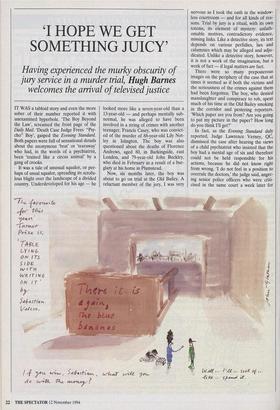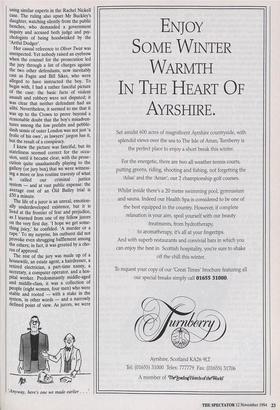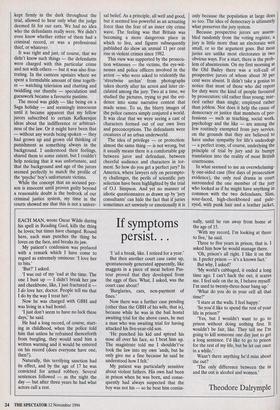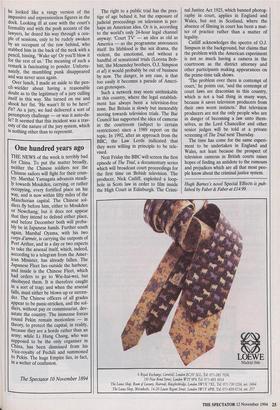`I HOPE WE GET SOMETHING JUICY'
IT WAS a tabloid story and even the more sober of their number reported it with unexamined hyperbole. 'The Boy Beyond the Law', screamed the front page of the Daily Mail. 'Death Case Judge Frees "Psy- cho" Boy', gasped the Evening Standard. Both papers were full of sensational details about the anonymous 'brat' or 'tearaway' who had, in the words of a psychiatrist, been 'trained like a circus animal' by a gang of crooks.
It was a tale of unusual squalor, or per- haps of usual squalor, spreading its scrofu- lous blight over the landscape of a divided country. Underdeveloped for his age — he looked more like a seven-year-old than a 13-year-old — and perhaps mentally sub- normal, he was alleged to have been involved in a string of crimes with another teenager, Francis Casey, who was convict- ed of the murder of 88-year-old Lily Not- ley in Islington. The boy was also questioned about the deaths of Florence Andrews, aged 80, in Barkingside, east London, and 79-year-old John Buckley, who died in February as a result of a bur- glary at his home in Plumstead.
Now, six months later, the boy was about to go on trial at the Old Bailey. A reluctant member of the jury, I was very nervous as I took the oath in the window- less courtroom — and for all kinds of rea- sons. Trial by jury is a ritual, with its own totems, its element of mystery: unfath- omable motives, contradictory evidence, missing links. Like a detective story, its text depends on various perfidies, lies and calumnies which may be alleged and adju- dicated. Unlike a detective story, however, it is not a work of the imagination, but a work of fact — if legal matters are fact.
There were so many preposterous images on the periphery of the case that at times it seemed as if both the victims and the seriousness of the crimes against them had been forgotten. The boy, who denied manslaughter and conspiracy to rob, spent much of his time at the Old Bailey smoking in the corridor and pestering reporters. `Which paper are you from? Are you going to put my picture in the paper? How long do you think I'll get?'
In fact, as the Evening Standard duly reported, Judge Lawrence Verney, QC, dismissed the case after hearing the views of a child psychiatrist who insisted that the boy had a mental age of six and therefore could not be held responsible for his actions, because he did not know right from wrong. 'I do not feel in a position to overrule the doctors,' the judge said, anger- ing senior police officers who were criti- cised in the same court a week later for using similar experts in the Rachel Nickell case. The ruling also upset Mr Buckley's daughter, watching silently from the public benches, who demanded a government inquiry and accused both judge and psy- chologists of being hoodwinked by the `Artful Dodger'.
Her casual reference to Oliver Twist was unexpected. Yet nobody raised an eyebrow when the counsel for the prosecution led the jury through a list of charges against the two other defendants, now inevitably cast as Fagin and Bill Sikes, who were alleged to have instructed the boy. To begin with, I had a rather fanciful picture of the case: the basic facts of violent assault and robbery were not disputed; it was clear that neither defendant had an alibi. Nevertheless, it seemed to me that it was up to the Crown to prove beyond a reasonable doubt that the boy's misadven- tures among the low prefabs and pebble- dash semis of outer London was not just 'a frolic of his own', as lawyers' jargon has it, but the result of a conspiracy. I knew the picture was fanciful, but its stateliness seemed correct for the occa- sion, until it became clear, with the prose- cution quite unashamedly playing to the gallery (or jury box), that we were witness- ing a more or less routine travesty of what is called our criminal justice system — and at vast public expense: the average cost of an Old Bailey trial is £50 a minute.
The life of a juror is an unreal, emotion- ally underdeveloped existence, but it is lived at the frontier of fear and prejudice, as I learned from one of my fellow jurors on the very first day. 'I hope we get some- thing juicy,' he confided. 'A murder or a rape.' To my surprise, his outburst did not provoke even shrugging bafflement among the others; in fact, it was greeted by a cho- rus of approval. The rest of the jury was made up of a housewife, an estate agent, a hairdresser, a retired electrician, a part-time nanny, a secretary, a computer operator, and a hos- pital worker. Predominantly middle-aged and middle-class, it was a collection of people (eight women, four men) who were stable and rooted — with a stake in the system, in other words — and a narrowly defined point of view. As jurors, we were
'Anyway, here's one we made earlier . . .
kept firmly in the dark throughout the trial, allowed to hear only what the judge deemed fit for our ears. We had no idea who the defendants really were. We didn't even know whether either of them had a criminal record, or was a professional thief, or whatever.
It was right and just, of course, that we didn't know such things — the defendants were charged with this particular crime and not with others — but it was also frus- trating. In the canteen upstairs where we spent a formidable amount of time togeth- er — watching television and chatting and twiddling our thumbs — speculation and guesswork became a favourite pastime.
The mood was giddy — like being on a Saga holiday — and seemingly innocuous until it became apparent that my fellow jurors subscribed to certain Kafkaesque ideas about the indifference or arbitrari- ness of the law. Or it might have been that — without any words being spoken — they had grown up and grown old thinking of punishment as something always in the background. I understood their feelings, shared them to some extent, but I couldn't help noticing that it was unfortunate, and that the background and age of the jurors seemed perfectly to match the profile of the 'psycho' boy's unfortunate victims.
While the concept that an accused per- son is innocent until proven guilty beyond a reasonable doubt is the bedrock of our criminal justice system, my time in the courts showed me that this is not a univer- sal belief. As a principle, all well and good, but it seemed less powerful as an actuating force than the fear of an inner city crime wave. The feeling was that Britain was becoming a more dangerous place in which to live, and figures subsequently published do show an annual 11 per cent rise in violent crimes since 1982.
This view was supported by the prosecu- tion witnesses — the victims, the eye-wit- nesses and police officers involved in the arrest — who were asked to reidentify the `streetwise urchin' from photographs taken shortly after his arrest and later cir- culated among the jury. Two at a time, we studied the pictures, trying to put the evi- dence into some narrative context that made sense. To us, the blurry images of the police camera simply conjured a world. It was clear that we were seeing a cast of characters formed out of our own lives and preconceptions. The defendants were creatures of an urban underworld.
The idea of privilege — or protection: almost the same thing — is not wrong, but it usually means there is a comfortable gap between juror and defendant, between cheerful audience and characters in tor- ment. So how do you get a perfect jury? In America, where lawyers rely on perempto- ry challenges, the perils of scientific jury selection have been highlighted by the trial of O.J. Simpson. And yet no manner of idiotic questionnaires as drawn up by 'jury consultants' can hide the fact that if juries sometimes act unwisely or emotionally it is only because the population at large does so too. The idea of democracy is ultimately what preserves the jury system.
Because prospective jurors are assem- bled randomly from the voting register, a jury is little more than an electorate writ small, or so the argument goes. But most juries are unlike most electorates in two obvious ways. For a start, there is the prob- lem of absenteeism. On my first morning at the Old Bailey there was a roll-call of prospective jurors of whom about 30 per cent were absent. It didn't take a genius to notice that most of those who did report for duty were the kind of people favoured by prosecutors: old rather than young; mar- ried rather than single; employed rather than jobless. Nor does it help the cause of democracy or justice that members of pro- fessions — such as teaching, social work, psychology and the like — are among the few routinely exempted from jury service, on the grounds that they are believed to have undue sympathy for life's underdogs — a perfect irony, of course, underlying the principle of trial by jury and its bumpy translation into the reality of most British courtrooms.
In what seemed to me an overwhelming- ly one-sided case (five days of prosecution evidence), the only real drama in court surrounded the one member of the jury who looked as if he might have anything in common with the two defendants. Slim, sour-faced, high-cheekboned and pale- eyed, with punk hair and a leather jacket, he looked like a rangy version of the impassive and expressionless figures in the dock. Looking ill at ease with the court's formality and with the posh accents of the lawyers, he dozed his way through a cou- ple of sessions, only to be rudely awoken by an occupant of the row behind, who stabbed him in the back of the neck with a pencil, hissing, 'Wake up! Or you'll blow it for the rest of us.' The meaning of such a remark is fascinating to ponder. Unfortu- nately, the mumbling punk disappeared and was never seen again. Over lunch, I made an aside to the pen- cil- wielder about having a reasonable doubt as to the legitimacy of a jury culling itself in this way. She turned on me and shook her fist. 'He wasn't fit to be here!' Fit? As a jury, we had delivered a sort of peremptory challenge — or was it auto-da- fe? It seemed that this incident was a trav- esty of the nature of the jury system, which is nothing other than to represent. The right to a public trial has the pres- tige of age behind it, but the exposure of judicial proceedings on television is per- haps an American idea. Or it is, according to the world's only 24-hour legal channel anyway: 'Court TV' — an idea as old as America — so the programme announces itself. Its lifeblood is the sex drama, the violent, the emotional, and without a handful of sensational trials (Lorena Bob- bitt, the Menendez brothers, O.J. Simpson et al) it would probably be out of business by now. The danger, in any case, is that too easily it becomes a parade of Ameri- can grotesques. Such a network may seem unthinkable in this country, where the legal establish- ment has always been a television-free zone. But Britain is slowly but inexorably moving towards television trials. The Bar Council has supported the idea of cameras in the courtroom (subject to certain restrictions) since a 1989 report on the topic. In 1992, after an approach from the BBC, the Law Lords indicated that they were willing in principle to be tele- vised.
Next Friday the BBC will screen the first episode of The Trial, a documentary series which will broadcast court proceedings for the first time on British television. The producer, Nick Catliff, exploited a loop- hole in Scots law in order to film inside the High Court in Edinburgh. The Crimi- nal Justice Act 1925, which banned photog- raphy in court, applies in England and Wales, but not in Scotland, where the absence of filming in court has been a mat- ter of practice rather than a matter of legality.
Catliff acknowledges the spectre of O.J. Simpson in the background, but claims that the problem with the American experiment is not so much having a camera in the courtroom as the district attorney and other participants making appearances on the prime-time talk shows.
`The problem over there is contempt of court,' he points out, 'and the contempt of court laws are draconian in this country, which is not a bad thing in many ways, because it saves television producers from their own worst instincts.' But television producers are not the only people who are in danger of becoming a law unto them- selves, as the Lord Chancellor and other senior judges will be told at a private screening of The Trial next Thursday.
The time has come for the same experi- ment to be undertaken in England and Wales, not least because the prospect of television cameras in British courts raises hopes of finding an antidote to the rumours and prejudices which are all that most peo- ple know about the criminal justice system.
Hugh Barnes's novel Special Effects is pub- lished by Faber & Faber at £14.99.





































































 Previous page
Previous page